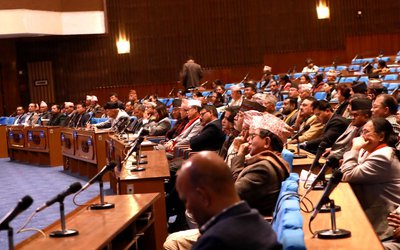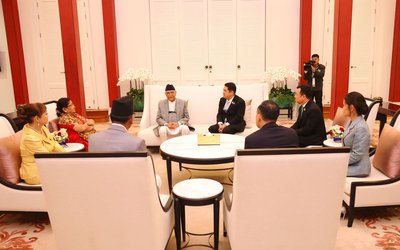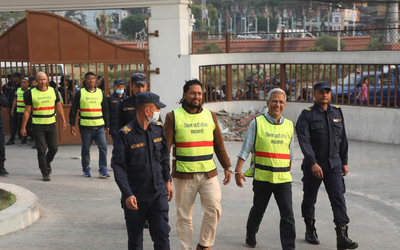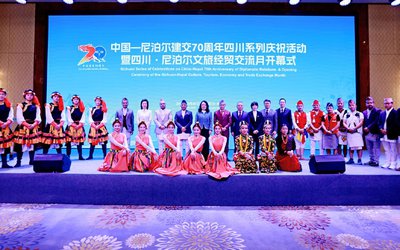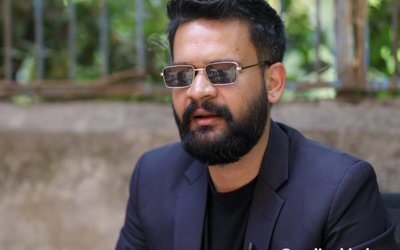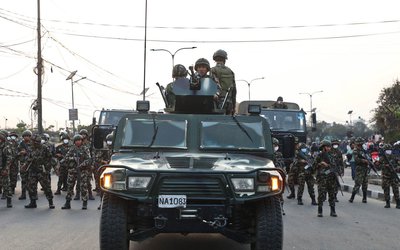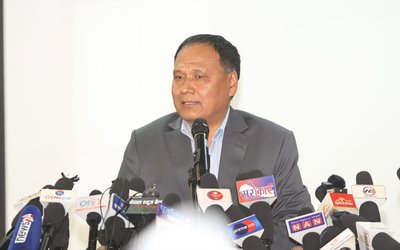
Forty years ago, when he was 18, Binod Chaudhary had to discontinue his studies and take over the reins of his family business. His father had been incapacitated by a heart attack, and he had no brothers to look after the "modest" business that involved selling fabric imported from Japan and India, and running a department store, amongst other activities.
Chaudhary, who recently became Nepal's first dollar-billionaire (as per Forbes' 2013 list), also inherited from his ailing father a biscuit business. "In those days, cardiac problems were a much bigger issue than they are today. Doctors asked my father to stay away from the business. As the oldest of his three children, I had to take the plunge," says the chairman and managing director of the Kathmandu-headquartered conglomerate Chaudhary Group (CG), which has in its fold as many as 80 companies and offices in 19 countries across the world. (Chaudhary did not disclose the group's annual revenues.)
"Yes, we can do business in Nepal and still succeed. That is what I proved," he says proudly, seated in his MG Road office in Delhi. It may be sheer coincidence but Chaudhary's grandfather, Bhuramal, too, was 18 when he left his village in Rajasthan in the late 19th century to do business in Nepal, which is still one of the world's poorest countries.
"When I was 18 and when I entered my family business, I soon realised that it wasn't as easy as I thought. I had to deal with people of my father's generation. Building trust was key to doing business. I somehow managed to do that," recalls Chaudhary, whose group is currently present in diverse sectors, from food parks and food processing to real estate, hospitality and power, banking and telecom.
Why Noodles? Wai Not?
Some 35 years ago, Chaudhary watched people returning from Thailand with packets of noodles. Nepal Airlines and Thai Airways International had just started flying to the capital cities of the two countries. Soon, it was clear that there was a craze for Thai noodles in Nepal. It was then that the idea of setting up his own noodles brand struck him.
Wai Wai, the iconic noodles brand from CG, was soon born. A ready-to-eat meal unlike many other cup noodles which have to be heated, it became an instant hit not only in Nepal but also in India's northeast before it spread to other parts of India and the world. "Now, thanks to Wai Wai, we have 2% share of the world's noodles market," says Chaudhary whose group has a tie-up with the Taj group of hotels in Sri Lanka, Thailand and Maldives. CG runs hotels as well, from 4-star brands to luxury and boutique categories. It runs the Hilton DoubleTree in New York.
Soon, the businessman of Rajasthan origin began to spread his footprint, venturing into food parks, banking and insurance, healthcare, telecom, real estate and power. In India, CG has acquired land for setting up a food park near Ajmer in Rajasthan. It is also building a corporate park in Gujarat. It also has several production facilities of Wai Wai noodles in India, including at Chittoor (Andhra Pradesh), Gangtok (Sikkim) Silchar (Assam), and Ahmedabad (Gujarat). The company is also in the process of taking the Zinc brand of hotels to Kochi by constructing one there.
Marxist Lawmaker, Political Role
The self-effacing Chaudhary, who is also a former member of parliament representing the Communist Party of Nepal (Unified Marxist-Leninist) party or the CPN-UML in the House, doesn't want to project himself as the creator of a company that has become a burnished showpiece of Nepalese enterprise.
But he acknowledges the role he has played in the country's politics during the transition from monarchy to democracy. While he was a member in the erstwhile parliament, which, in fact, discussed the Constitution of the country, he was instrumental in putting the spotlight on the economy part of the Constitution, he says. "They [CPN-UML] wanted me to come and contribute in the making of the Constitution as a person who is known within and outside the country."
"My contribution to my country was to engage with different political parties — 80% of the elected members came one way or the other from a Leftist background. The house that we elected [last time] was so inclusive that 90% of the faces were new," he notes. These MPs came from the villages and mountains. They may not have been educated, but they knew what was happening in Nepal, explains Chaudhary. He saw them as the true representatives of their people. "To engage with these people and develop a kind of consensus on economic issues was a huge challenge, but we did it," he recalls.
The Economic Times
- IME GROUP: Expands Into Paper Industry
- Mar 24, 2025
- CPN UML: Instigated By India
- Mar 23, 2025
- ADB’S CHIEF ECONOMIST: Nepal Reduces Poverty
- Mar 11, 2025
- FM DR. DEUBA: A Successful Visit
- Mar 11, 2025
- MD GHISING: Target Of Personal Grudge
- Mar 09, 2025
